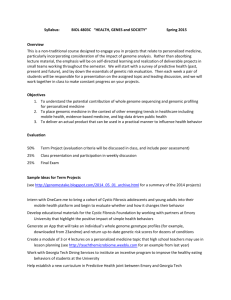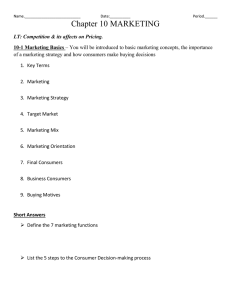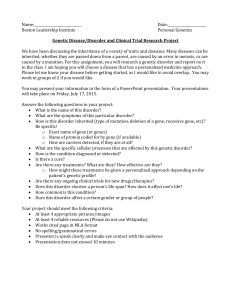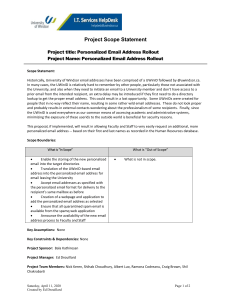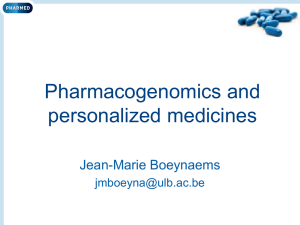September 15, 2015 Team 1 (Arwa Alhamed, Fahad Almsned)
advertisement
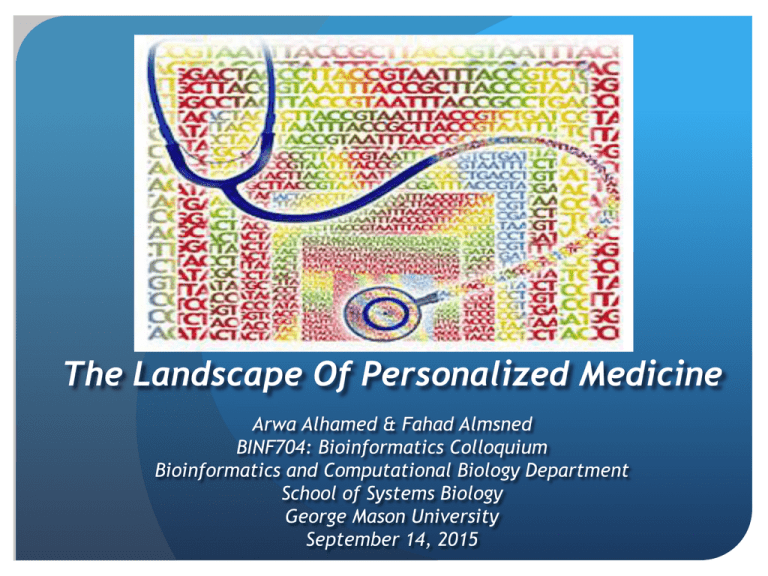
The Landscape Of Personalized Medicine Arwa Alhamed & Fahad Almsned BINF704: Bioinformatics Colloquium Bioinformatics and Computational Biology Department School of Systems Biology George Mason University September 14, 2015 Outline Introduction and important milestones in PM’s journey PM in present day practice Relation to other disciplines Role in drug development Redefinition of traditional RCT Role in Disease prognosis Ethical considerations Key players in the development of personalized medicine Future of personalized medicine Benefits of personalized medicine’s impact on today’s medicine Personalized medicine limitation Conclusion References Introduction Personalizing medicine? Shifting from traditional medicine to PM. o Increase in Knowledge o Variations in response to therapy PM In Present Day Practice Personalized Medicine Medical model that proposes the customization of healthcare - with medical decisions, practices, and/or products being tailored to the individual patient. [1] Important Milestones [2] 1990 Official Launch of the Human Genome Project. April 16, 1999 1st publication entitled “New Era of Personalized Medicine—Targeting Drugs for Each Unique Genetic Profile” by Robert Langreth and Michael Waldholz. [3] 2000 Human Genome Project have completed a rough draft of the human genome. “the most important, most wondrous map ever produced by humankind.” Important Milestones [2] 2002 International HapMap project officially launches. 2003 The Human Genome Project is completed 2005 Cancer Genome Atlas project , publication of HapMap. 2008 GINA is signed into law PM In Present Day Practice PM In Present Day Practice PM In Present Day Practice Relation To Genetic Medicine [4] The advancement in Genetic Medicine forms the basis of PM. Distinct nature of the genome. Variations in the human genome. PM Vs GM. Systems Biology and Pharmacology[5][6] Systems biology Developing tools to detect minute changes in molecular profiles. Physiological environmental factors exposed to gene expression. Systems Pharmacology Identity the genes and proteins responsible for drug treatment. PM In Present Day Practice Biomarkers [7] Biomarkers • Measure indicators of the actual biology, disease or drug response. • Exist as proteins, DNA, mRNA, or radiological parameters. • Applicable in areas of disease risk estimation, diagnostic screening, diagnosis, prognosis, prediction, and response monitoring. Biomarkers [7] Biomarkers Used in determining dose size for clinical trials. Pharmacodynamics tests limitation. Biomarkers maximum doses are determined by the presence of specific biomarkers. (Reduction of Ki67 as a response to MEK inhibitor) Drug Development [8] Story of Trastuzumab 30% of breast cancer patients unresponsive to SOC. Over expression of HER2 receptors. Clinical Trail Design [9] PM Redefining the traditional RCT. No control or placebo arms. Eliminate ethical concerns of using placebo. Clinical Trail Design [9] Most oncology drugs are approaching PM trial design Crizotinib (ALK-EML4) inhibitor ALK-EML4 fusion is the driver for lung cancer progression Included 82 lung cancer patients tested positive for the biomarker ALK with no control group. Favorable results as early as after 48 h with statistically significant outcome as well. Prognostic factor PM has facilitated genetic-based assessment. Abacavir hypersensitivity reactions. Traditionally, diagnosed after clinical manifestations of symptoms. A study by Mallal et al.,[10] proved a genetic linkage between the hypersensitivity and HLAB*57:01. Upon investigation, patients who were tested negative for this gene were not hypersensitive to abacavir and vice versa Steering of both FDA and European Medicines Agency to require of the pharmaceutical industries to include in their label precautions the need to have gene testing prior to abacavir therapy. Prognostic factor Ethical considerations [11] Primarily concern the protection of genetic information and other private information of participating individuals. In the US, the Genetic Information Nondisclosure Act (GINA) ensures the ethical use of genetic information. The focus is on obtaining approval for the molecular diagnostic tests and the drugs related to the PM. FDA encourages but does not make it mandatory to submit pharmacogenetic and pharmacogenomic data during the drug development. Key Players in the Development of Personalized Medicine Industrial players: pharmaceutical and biotechnology companies; Hoffman-La Roche. Academic institutions; Pfizer/Harvard Medical School, Perlegen/George Washington University and Pathway Diagnostics/Duke University. Scientific players: Clinical laboratories; Genomas ®. Health Information Technology (HIT); The Cancer Biomedical Informatics Grid. Medical professions. Political, and socioeconomic players; Personalized Genome Project. Future of Personalized Medicine Future of Personalized Medicine Genomic projects Translational Science and medicine, and personal genetic testing. Conventional medicine evolution to personalized medicine 1. Genomic Projects Molecular diagnostic of breast cancer, 2005. Personal Genome Project Genome-Wide Association Studies (GWAS) 1000 Genome Project 2. Translational Science and Medicine, and Personal Genetic Testing Biomarkers, animal models, bioinformatics, and image analysis software. Long-term genetic testing. 3. Conventional Medicine Evolution to Personalized Medicine Increasing genomic knowledge. Safer and cost-effective medications; Genomics Personalized Medicine Act of 2006. Benefits of Personalized Medicine’s Impact on Today’s Medicine High precision effective and low-cost treatment; metastatic colorectal cancer Improving quality of life for healthy and patient individuals. Avoiding trail-and-error approach used by physicians in the diagnosis and the treatment of a disease. Lowering drug development cost and time; Ellen Roche’s death Attribution to the discovery of new safer and more effective treatments in the market. “hope rescue failed drugs”; saving drugs which worked for particular health cases. Personalized Medicine’s Limitation Common diseases’ treatment personalization. Environmental factors’ impact on drug response. Government and healthcare institution support shortage; data entries in developed countries vs. third world countries. Legal, ethical, and social issues; Verisante. “Incidentalome”. Conclusion Stakeholders Patient Physicians Medical Practice Pharmaceutical and biotechnology companies Regulatory authorities Government and healthcare agencies Personalized medicine stands a promising chance of overtaking conventional medicine in the future, but couldn’t totally rule it out.. References 1. "Personalized Medicine 101". Personalized Medicine Coalition. Retrieved 26 April 2014. 2. https://hms.harvard.edu/news/harvard-medicine/expanded-timeline-personalized-medicine 3. Langreth R, Waldholz M. New era of personalized medicine: Targeting drugs for each unique genetic profile. The Oncologist 1999;4:426-427 4. Jain KK. Netherlands: Springer Science+Business Media; 2009. Textbook of Personalised Medicine. 5. Chen R, Snyder M. Systems biology: Personalized medicine for the future? Curr Opin Pharmacol. 2012;12:623– 8. 6. Wist AD, Berger SI, Iyengar R. Systems pharmacology and genome medicine: A future perspective. Genome Med. 2009;1:11. 7. Kennedy R. Biomarkers and Personalised Medicine. 2013. 8. Feinstein Kean Healthcare. What is Personalized Medicine?; 2013. 9. Vaidyanathan G. Redefining clinical trials: The age of personalized medicine. Cell. 2012;148:1079–80. 10. Mallal S, Phillips E, Carosi G, Molina JM, Workman C, Tomazic J, et al. HLA-B*5701 screening for hypersensitivity to abacavir. N Engl J Med. 2008;358:568–79. 11. Jain KK. Netherlands: Springer Science+Business Media; 2009. Textbook of Personalised Medicine. Any Questions? Thank You For Listening! Arwa Alhamed and Fahad Almsned Bioinformatics and Computational Biology Department School of Systems Biology George Mason University
